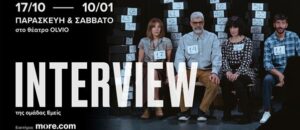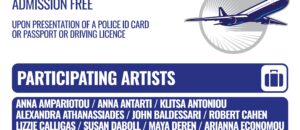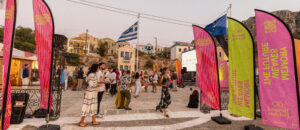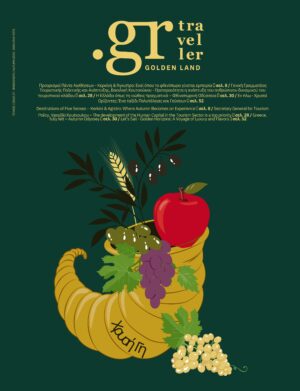For acclaimed pianist Lydia Iatraki, music is an inseparable companion—whether on stage at the Athens Megaron, in major international concert halls, or in the remote corners of Greece, where she envisions volunteering to introduce children to the magic of sound. She shares insights on her high-level studies in Greece and abroad, the mentors who shaped her musical identity, and the deep gratitude she feels for every experience—all in the name of music.
As a pianist with international experience, how do you perceive music as a companion on your travels? Is there a specific piece you associate with a particular destination?
Exactly as you said—music is truly a “companion.” It’s your company. For me, there’s nothing more beautiful than having music both as your inner companion and as the reason you travel. Every time I packed my suitcase, the first and last thing I made sure to include was my sheet music. Even if I forgot my phone, I could somehow find a solution. But forgetting my scores? Unthinkable. Of course, in our field it’s expected to memorize works, but still—you feel like you’re leaving a part of yourself behind if you don’t have your music with you,

In your debut with the Athens Youth Symphony Orchestra, you performed works by Mozart. How did you experience that moment, and what does Mozart’s music mean to you?
If you asked me to highlight one moment from my entire life, I believe it would be that period. I remember the rehearsals, the nerves, the anxiety for everything to go well. I was entering spaces I’d never imagined myself in as a musician—rehearsing at the Athens Concert Hall, performing at ERT, working with our wonderful conductor Pavlos Sergiou and all the orchestra members, whom I thank deeply. It was a time I’d describe with one word: fullness. I experienced a profound sense of wholeness.
You have studied and lived in different countries. How have these cultural experiences shaped your interpretative approach?
I consider myself fortunate to have been exposed to diverse cultural environments. During my two years in Scotland, while completing my postgraduate studies at the Royal Conservatoire with a scholarship, I was struck by the technical precision of the Chinese students and the profound expressivity of the Russian ones. Among my professors, I especially remember Aaron Shorr, who transformed the way I approached technique—clarity, speed, accuracy. At the time, I was working on Chopin’s Piano Concerto No. 2, which includes some particularly challenging passages, especially in the final movement. I remember asking him, “How is this possible?” and he responded, “Practice until you play it. Don’t accept ‘no’ as an answer.” That phrase changed something in me. From that point on, I applied that mindset to every technical challenge I encountered.
And from my years at Deree College in Athens, I must mention the teacher who shaped my musical life more than anyone else: Tatiana Papageorgiou. I love her deeply, respect her, admire her.

What is the importance of music education in Greece today, and how do you see the future of young musicians in the country?
The most important factor in a child’s musical journey is the teacher. I was blessed, as I mentioned, to have Tatiana Papageorgiou—she offered me what I believe is the most crucial element of success: guidance and inspiration. I believe it is vital for the state to support the arts—starting from school infrastructure and music educators—to provide children with the motivation to learn an instrument and to be exposed more broadly to music.
Parents also play a vital role—by taking their children to concerts, festivals, or even just playing beautiful music at home. These experiences can spark something transformative.

How do you prepare—mentally and technically—before a concert in a new environment or country?
Over the years, you learn what truly works for you. These are the “secrets” I now pass on to my students: cultivate calm, engage deeply in mental practice, and, above all, pray.
You’ve taken part in masterclasses with internationally renowned pianists. Was there a defining moment or piece of advice that stood out?
A special memory was my two-week masterclass at the Mozarteum in Salzburg. It was the first time I was exposed to the global stage as a young pianist. I encountered healthy competition, met pianists from all over the world, and got a clearer sense of what I could do, what I couldn’t do (yet), and what I wanted to achieve—and, perhaps more importantly, what I didn’t.

What are your next steps, and how do you envision the continuation of your musical journey?
I feel grateful for all the experiences I’ve had so far. My love for teaching, now an inseparable part of my life, along with my love for Greece’s countryside and islands, led me to envision a series of piano seminars exclusively for remote areas of the country—places where children don’t have the same access to opportunities as those in major cities. These seminars will be offered on a volunteer basis to children of all ages and levels, with the aim of initiating them into what inspired me—both as a child and as an adult.
My next recital will take place at the Athens Concert Hall on November 3, as part of the celebrations marking 100 years since the birth of Mikis Theodorakis.

















